- Dr Aswini Presents a Poster on the International Stage August 23, 2023
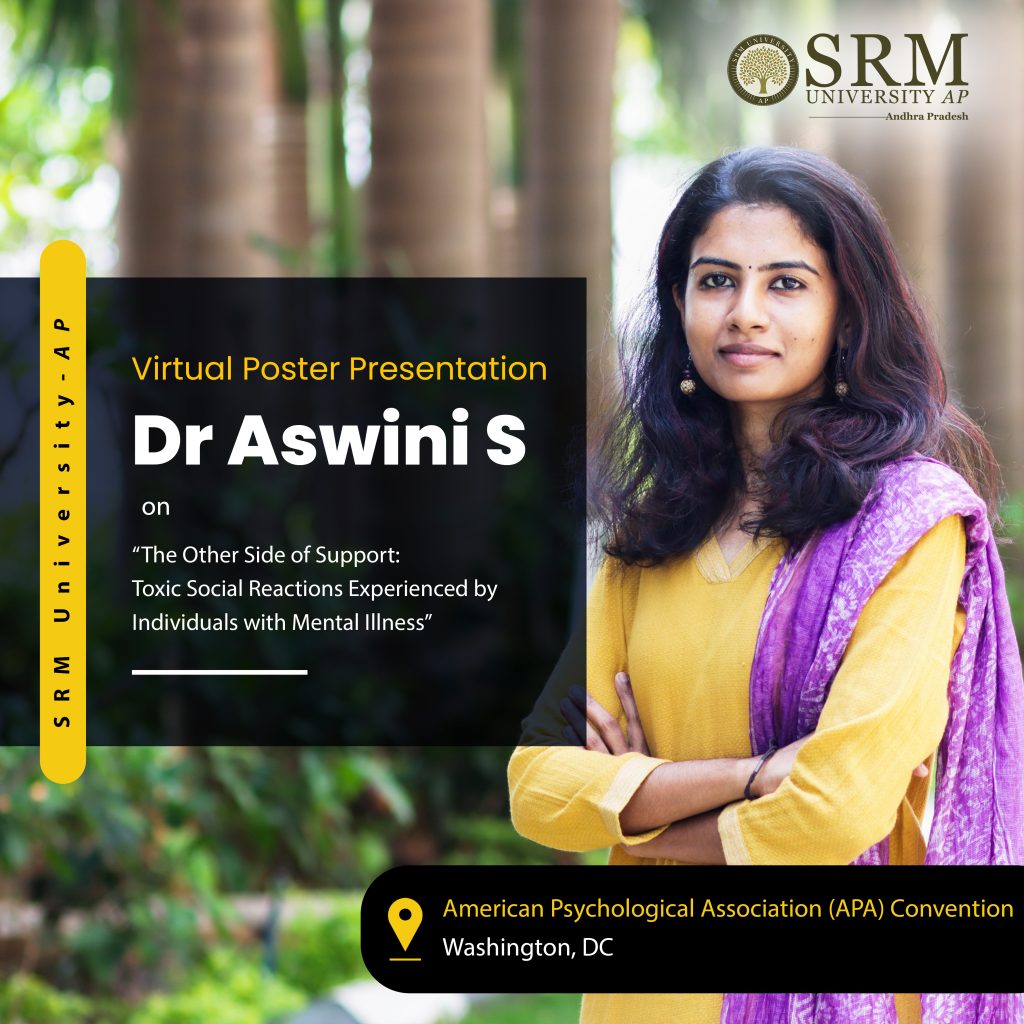 In a proud moment that highlights our institution’s commitment to excellence and innovation, we are thrilled to share the success of a recent poster presentation that graced the global stage.Dr Aswini S, Assistant Professor at the Department of Psychology at SRM University-AP recently represented the varsity at the American Psychological Association (APA) Convention in Washington, DC from August 3 – 5, 2023. The occasion was a prestigious Poster Presentation, titled, “The Other Side of Support: Toxic Social Reactions Experienced by Individuals with Mental Illness”
In a proud moment that highlights our institution’s commitment to excellence and innovation, we are thrilled to share the success of a recent poster presentation that graced the global stage.Dr Aswini S, Assistant Professor at the Department of Psychology at SRM University-AP recently represented the varsity at the American Psychological Association (APA) Convention in Washington, DC from August 3 – 5, 2023. The occasion was a prestigious Poster Presentation, titled, “The Other Side of Support: Toxic Social Reactions Experienced by Individuals with Mental Illness”Abstract
Social support is undeniably an important aspect of everyday life, and it is particularly
important in the context of challenges. The role of social support as a protective factor is well established (Wright et al., 2013) in research, especially in the context of mental illness (Frame, 1981; Teo et al., 2020). While acknowledging the overwhelming evidence on the importance of social support, there is scant literature on the negative experiences of seeking and receiving support. The qualitative investigation revealed the toxic social reactions under the disguise of social support as reported by participants with mental illness (N=17). Participants experienced interactions which sometimes resembled social support but were either harmful or not beneficial to them. The frequently reported reactions of participants are trivialising of symptoms, toxic positivity, and fake sympathy. In comparison to physical illness, the indicators of mental illness are less objectively perceptible to others. Hence, the practice of dismissing symptoms and attributing disorders as momentary feelings, or imaginary experiences are found to be common. Moreover, the suggestion to be positive and reject anything that may trigger negative emotions along with the display of fake sympathy by people around is also found in participant narratives. This signifies the importance of studying social support through different dimensions rather than just focusing only on support that is helpful and beneficial. Future explorations can focus on understanding specific sources of support, kinds of support and the impact that such challenges have on the quality of relationships with significant others.
Keywords: Toxic positivity, mental illness, social supportThe remarkable achievement underscores not only the quality of education we provide but also the dedication of our faculty in making impactful contributions to their fields.
Continue reading → - Delivered Lecture at the Two–day National Conference on Youth Development at RGNIYD July 7, 2023
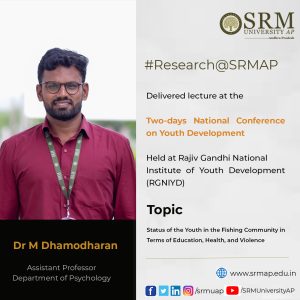 During the Two-day National Conference on Youth Development titled Youth in the 21st Century: Prospects and Psychosocial Challenges, organised by Rajiv Gandhi National Institute of Youth Development (RGNIYD), Sriperumbudur, Tamil Nadu, in collaboration with ICMR – NIRT, Chennai, Dr Dhamodharan, Assistant Professor, Department of Psychology, presented a lecture on Status of the Youth in Fishing Community in Terms of Education, Health, and Violence.
During the Two-day National Conference on Youth Development titled Youth in the 21st Century: Prospects and Psychosocial Challenges, organised by Rajiv Gandhi National Institute of Youth Development (RGNIYD), Sriperumbudur, Tamil Nadu, in collaboration with ICMR – NIRT, Chennai, Dr Dhamodharan, Assistant Professor, Department of Psychology, presented a lecture on Status of the Youth in Fishing Community in Terms of Education, Health, and Violence.Abstract
Over sixty percent of the fisher population in India is Below Poverty Line (BPL). For traditional fishers, fishing is their primary source of income, and they have no other options. Hence, families in the coastal village are socially, financially, and educationally disadvantaged and frequently face financial difficulties. Additionally, the literacy level of the fishing community is deficient. Fishers have met an unbalanced diet, tension, excessive drinking, tobacco usage, and harmful behaviours. Fisher communities are often underprivileged and constitutionally and communally isolated from other communities. Limited research has been conducted on the fishing community youth, particularly in Tamil Nadu and Pondicherry. Hence, the study needs to be understood and conducted for the fishing community youth regarding education, health, and violence. The empirical study combined quantitative and qualitative approaches to Tamil Nadu and Pondicherry fishing community youth. The study tools used for the data collection are a semi-structured questionnaire for youth for their perspective on health care, school, violence, and family support and a semi-structured questionnaire to the parents regarding their perspective on their children’s education, health, violence, and family support. Twenty case studies were conducted in the selected clusters. Also conducted were key informant interviews with fishing community leaders in four clusters. The results showed that more than 50 % of participants face verbal violence, more than 80 % face physical violence, and nearly 25% face sexual violence. The fishing community is an under-educated, predominantly nuclear family, and the family income is less than ten thousand rupees monthly. Physical abuse had significantly associated with place of residence, Puducherry residing youth had more physical abuse than Tamil Nadu. The social-economic condition of the family and the parental education seemed to be better in the state of Tamil Nadu as compared to Puducherry. Youths from Puducherry had a greater risk of experiencing physical and verbal abuse. Parents had a relatively low level of awareness and understanding of child rights and laws. The study’s results helped to understand the problem of fisher community youth and their perception of parental care, education, health, and violence.
Practical Implementation of the Findings
- Social welfare department and local NGOs to take up need-based intervention programmes for the welfare of the fishing community and youth.
- The youth welfare department understands the problems of youth in the fishing community.
- Policymakers to develop policies and legislation for the youth of fishers in the education and health sectors.
- Understanding the problems and violence against the youth of the fisher community, as well as helping the Non-Government Organisations for making intervention programs at the community level.
- Assist the school administration in better understanding the Fisher community students’ situation and creating counselling centres in school settings.
- Multidisciplinary Challenges in Green Smart Cities Implementation June 30, 2023
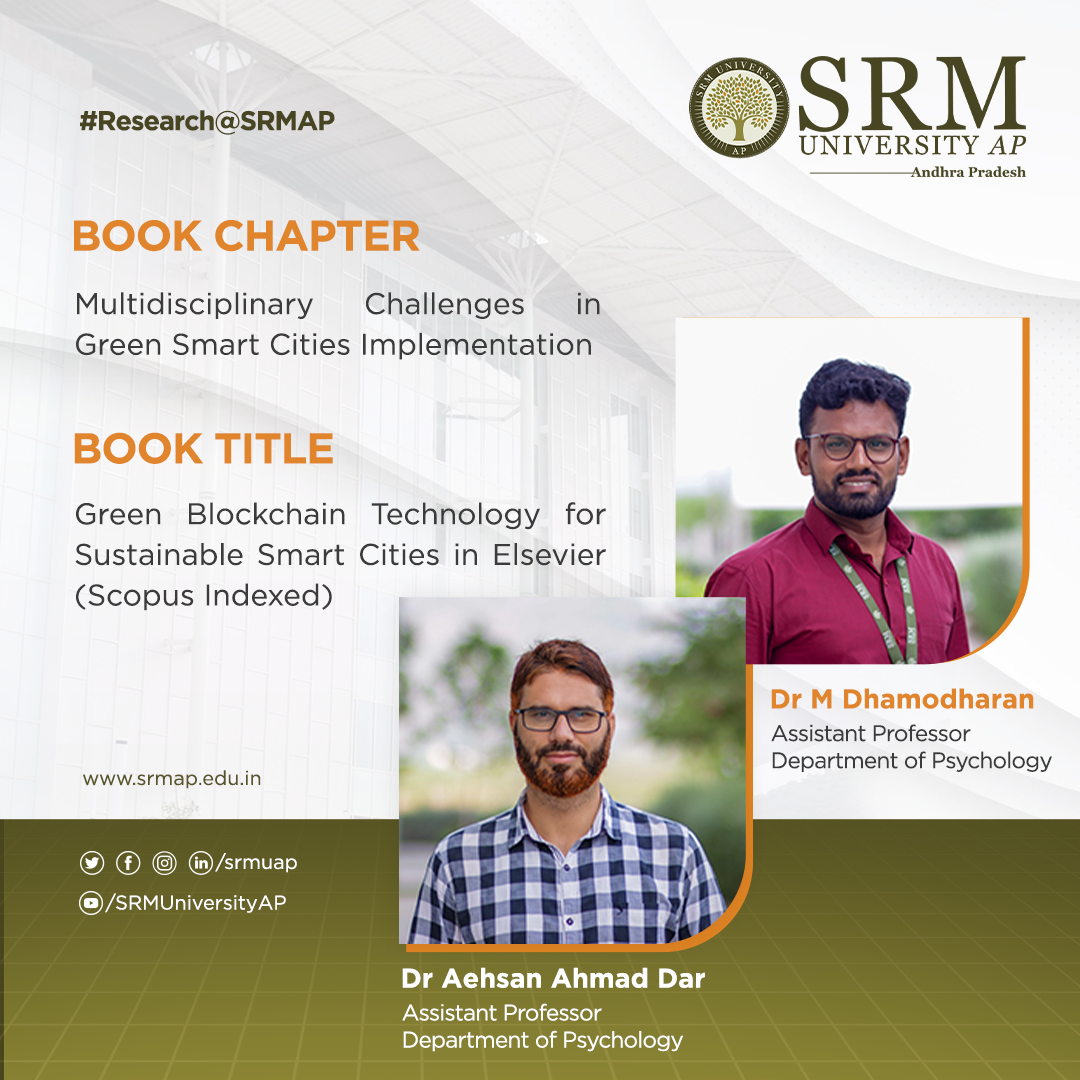 As the world grapples with the escalating challenges of urbanisation and environmental degradation, the concept of green smart cities has emerged as a promising solution. Green smart cities integrate advanced technologies, sustainable practices, and innovative urban planning to create environmentally friendly, resource-efficient, and liveable urban spaces. However, implementing green smart cities poses numerous multidisciplinary challenges that require careful consideration and collaborative efforts from various fields.
As the world grapples with the escalating challenges of urbanisation and environmental degradation, the concept of green smart cities has emerged as a promising solution. Green smart cities integrate advanced technologies, sustainable practices, and innovative urban planning to create environmentally friendly, resource-efficient, and liveable urban spaces. However, implementing green smart cities poses numerous multidisciplinary challenges that require careful consideration and collaborative efforts from various fields.Assistant Professors Dr Dhamodharan M and Dr Aehsan Ahmad Dar from the Department of Psychology have published a chapter titled Multidisciplinary Challenges in Green Smart Cities Implementation in the book Green Blockchain Technology for Sustainable Smart Cities in Elsevier, which is Scopus Indexed.
Focusing on challenges in green smart cities implementation will help the policymakers, government, and public to get aware of the problems related to all aspects. Implementing green smart cities may provide difficulties in the previously described dimensions of governance, economics, social interaction, technology, and ethics. Therefore, as the world’s population grows, there is a need to adapt to the changes, such as green smart cities. Government, policymakers, and the general public should adopt solutions to societal issues supported by science and research. The next generation will find it convenient and necessary to develop green smart cities. The world will prosper with green smart cities if policymakers, the government, and the people simultaneously identify the issues and begin the work properly with the right strategy and support.
Abstract
Villages are the pride of the nation. Nevertheless, cities reflect the nation’s growth and prospects. Department of Economic and Social Affairs in the United Nations explained that the universe’s people will be nearly 70 % in urban areas by 2050. Cities worldwide are facing important issues with increasing urbanisation, environmental sustainability, unemployment, slums, and mitigation of climate variation. So, policymakers and researchers focused on the concept of a smart city to manage these challenges. Consequently, the concept of “Smart Green Cities” came into the picture. Smart green cities are the collaborative hub linked with business, government, education, and the public to generate comfortable living in urban environments by encouraging change with scientific-based problem-solving. In simple terms, Green smart cities are technologically advanced in solving problems without harming the environment. For Implementing green smart cities, developed and developing countries are collaborating and signing a memorandum of understanding with one another. Government representatives, educators, and the public should cooperate to make a green smart city successful.
Green smart cities make global connectedness, productivity, efficiency, and revolution possible. Meanwhile, poorly regulated green smart cities will result in environmental difficulties like socioeconomic inequalities, poor public safety, and conservational destruction. Furthermore, implementing green smart cities is not a simple strategy. This chapter discusses multidisciplinary challenges in green smart cities’ implementation. People face challenges through green smart cities implementation in the following sustainability dimensions such as Blockchain challenges, Governance challenges, Economic challenges, Social challenges, Technology challenges, Environmental challenges, and Ethical challenges.
Collaborations
- Dr Dhamodharan M, Assistant Professor, Department of Psychology, School of Liberal Arts and Social Sciences, SRM University-AP.
- Mr Vimalkumar, Research Scholar, Department of Mechanical Engineering, Indian Institute of Technology, Palakkad, Kerala
- Dr Aehsan Ahmad Dar, Assistant Professor, Department of Psychology, School of Liberal Arts and Social Sciences, SRM University-AP.
- Delivered Lecture at the Two – day National Conference on Youth Development May 1, 2023
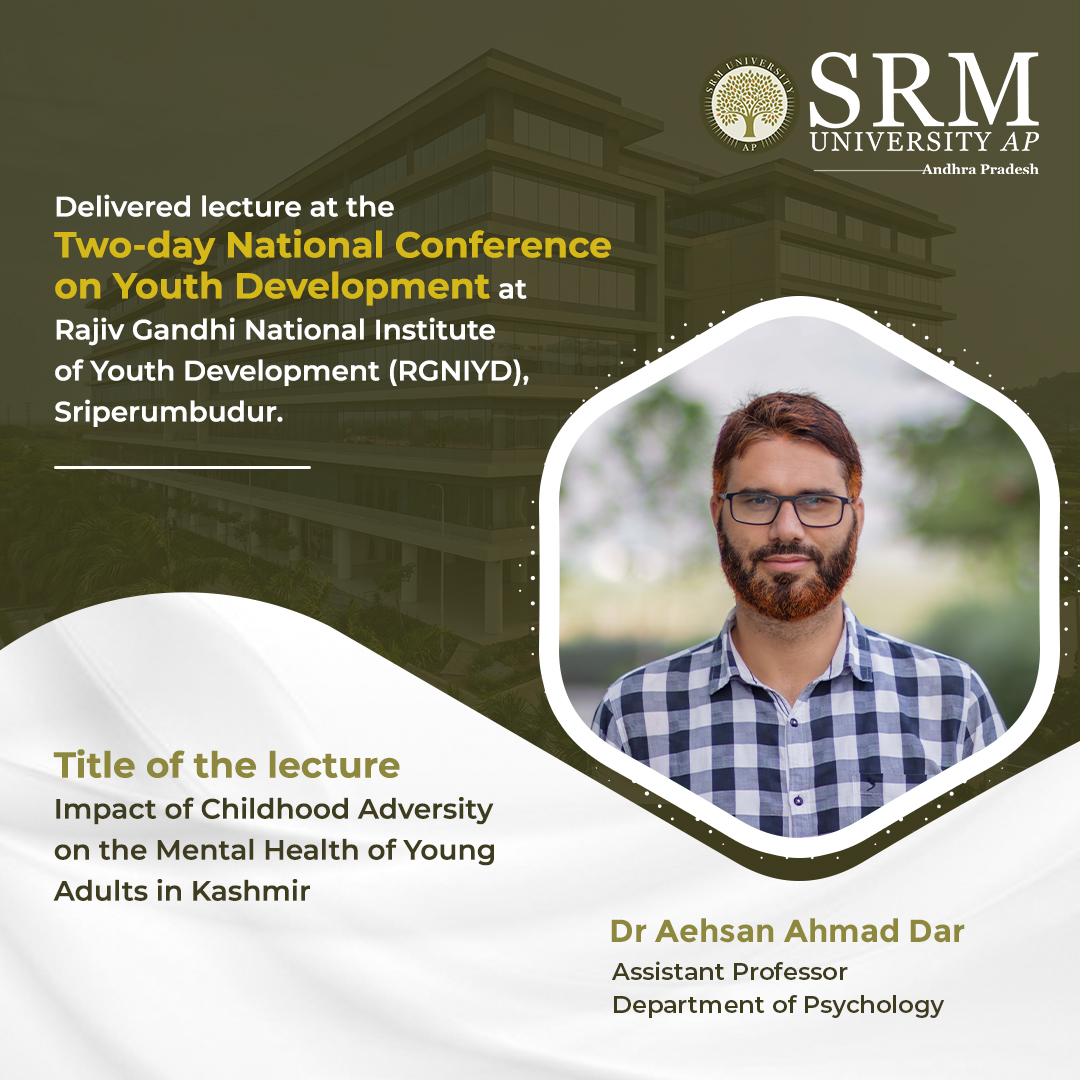 Dr Aehsan Ahmad Dar, Assistant Professor, Department of Psychology, delivered a lecture titled Impact of Childhood Adversity on the Mental Health of Young Adults in Kashmir at the Two – day National Conference on Youth Development held on March 24 and 25, 2023. Youth in the 21st Century: Prospects and Psychosocial Challenges was the theme of the conference, which was organised by the Department of Social Work and Department of Applied Psychology, Rajiv Gandhi National Institute of Youth Development (RGNIYD), Sriperumbudur, Tamil Nadu, in collaboration with ICMR – NIRT, Chennai.
Dr Aehsan Ahmad Dar, Assistant Professor, Department of Psychology, delivered a lecture titled Impact of Childhood Adversity on the Mental Health of Young Adults in Kashmir at the Two – day National Conference on Youth Development held on March 24 and 25, 2023. Youth in the 21st Century: Prospects and Psychosocial Challenges was the theme of the conference, which was organised by the Department of Social Work and Department of Applied Psychology, Rajiv Gandhi National Institute of Youth Development (RGNIYD), Sriperumbudur, Tamil Nadu, in collaboration with ICMR – NIRT, Chennai.Abstract of the Lecture
The study examines the impact of Adverse childhood experiences (ACEs) on mental health among young adults in Kashmir. A cross-sectional research design was followed to study the effect of ACEs on the mental health of Kashmiri youth by employing a multi-stage sampling method. Data were collected from 693 research participants who were studying in different colleges and universities in Kashmir, with the help of the Adverse Childhood Experiences scale and Mental Health Inventory (MHI-18). Findings revealed that various adversities during childhood, including psychological abuse, physical abuse, contact sexual abuse, household substance abuse, violent household treatment of mothers and fathers, household mental illness, and household criminal behaviour, had a significant impact on the mental health of Kashmiri youth in terms of increased anxiety, depression and loss of behavioural control and decreased positive affect.
Practical Implementation of the Findings
ACEs are traumatic events that individuals under 18 have experienced. Various individual, family, and community factors can affect a child’s likelihood of experiencing ACEs, and it causes long-term risks for mental health with the potential to carry over beyond the present generation. ACEs are linked to chronic health problems, mental illness, and adult risk-taking behaviours. There is a “dose-response relationship” between ACEs and health outcomes. Therefore, findings suggest advocating early targeted interventions to reduce ACEs and their impact on young people’s mental health in Kashmir. There is a need to design efficient measures, to enhance ACE resilience programs and ‘trauma-informed’ approaches to tackle the longer-term impact of ACEs on health and wellbeing.
Continue reading → - Presented Paper at the 32nd International Annual Convention of the National Academy of Psychology April 3, 2023
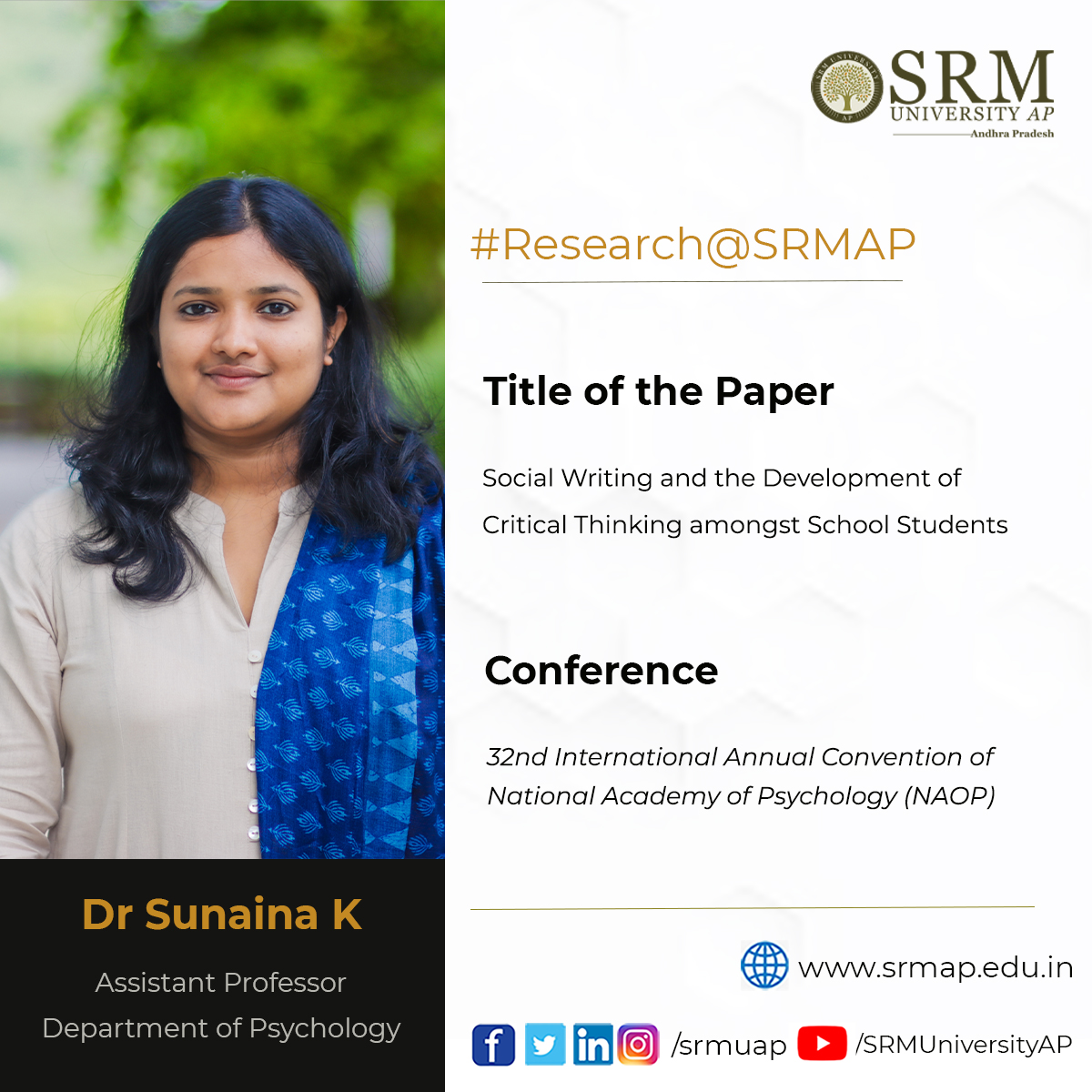 The Annual Conventions of the National Academy of Psychology (NAOP) aim to provide a platform to present, discuss, and debate issues that confront individuals, groups, and communities in this fast-changing world. Dr Sunaina K, Assistant Professor of the Department of Psychology, has presented a paper titled Social Writing and the Development of Critical Thinking amongst School Students at the 32nd International Annual Convention of the National Academy of Psychology (NAOP), held at Ahmedabad University, Gujarat, from March 3 to 5, 2023.
The Annual Conventions of the National Academy of Psychology (NAOP) aim to provide a platform to present, discuss, and debate issues that confront individuals, groups, and communities in this fast-changing world. Dr Sunaina K, Assistant Professor of the Department of Psychology, has presented a paper titled Social Writing and the Development of Critical Thinking amongst School Students at the 32nd International Annual Convention of the National Academy of Psychology (NAOP), held at Ahmedabad University, Gujarat, from March 3 to 5, 2023.Abstract
This study attempted to examine the texts, contexts and voices of young adolescents in social writing activities in schools and how thinking is constructed through the same activities. An intervention study of one-year duration on social writing, based on a longitudinal quasi-experimental design, has been conducted with 15 students in a government school in Kozhikode district in Kerala. The intervention programme was conducted with the help of a module of writing activities prepared by the researcher by using the Vygotskian pedagogic ideas. Each writing session was preceded by a dialogue session between the adult member and the students.
The study employed Thematic Content Analysis as the method of data analysis. The thematic analysis of the mediated learning of social writing unfolds the dialectical interplay between the human mediators, cultural tools and the motives for developing critical thinking skills in the students. From the analysis of the pattern of appearing ‘self-reflections’, a domain of critical thinking (Barnette, 1997), it can be said that interactive participation in the dialogue session enhances participation in the writing activities with the involvement of self. Active participation in the dialogue session helps the students gather maximum information on the theme of dialogues (collection of everyday concepts) and also makes some generalisations. These generalised ideas are transforming into conceptualised thoughts (thinking in ‘scientific concepts’) when the students go through in a deliberate, systematic thinking process while writing. This conceptualisation of ideas, visible in students’ texts, is the base of the critical thinking that is getting reflected in their writings and further helps them in critical reasoning, self-reflection and thinking about critical actions while writing.
Continue reading →

